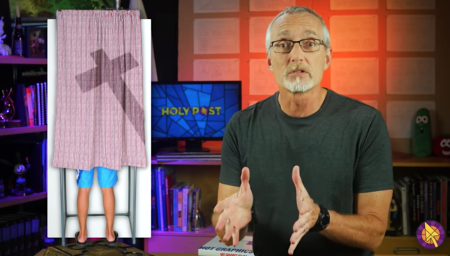‘VeggieTales’ creator on how Christians should vote: Neither party supports entirety of Bible

Phil Vischer, creator of the popular Christian animation "VeggieTales" and voice of Bob the Tomato, has been actively using his platform to address the political climate and recently offered some insight on how he believes Christians should vote.
The animator's most recent video provides a "Christian's guide to approaching the voting booth." It does not tell people who to vote for.
Vischer said the popular way of voting in this day and age is if “you're conservative, you vote for conservative candidates who will implement conservative ideas. If you're liberal, you vote for liberal candidates who will implement liberal ideas.” However, he noted that Christians do not fit in either category or at least they shouldn’t.
"What if you're Christian. Here's the deal, Christian teaching doesn't always line up neatly on the conservative or the liberal side,” he said. “Historically, evangelical Christians wouldn't have thought of themselves as either liberal or conservative. They thought of themselves as Christian.”
The Holy Post host said changes in America are what caused churchgoers to go along with the changes. Prior to the shift, he explained that Christians would support whichever policy or candidate “they agreed with most.”
“Beginning in the 1960s, something happened. Some people have called it ‘the big sort.’ Political scientist Alan Abramowitz calls ‘it the great alignment,’ where Americans rearrange themselves and their political parties along new lines, conservative and liberal, and the church followed right along,” Vischer noted.
He called these new labels ideological constraints but pointed out that in the 1950s few Americans identified themselves by ideology such as “liberal or conservative.”
“Ideas and policy proposals were accepted or rejected based much more on their merits and much less based on whether they match your ideological identity. That has changed radically,” Vischer stated.
“Today, the majority of Americans will reject policy ideas entirely based on their ideological identity. If I see myself as a conservative, I must reject any proposal that involves government programs or high taxes as a solution. If I see myself as a liberal, I must reject any proposal that emphasizes traditional family structure or traditional sexual morality as a solution. If I'm liberal, I must oppose any restriction on abortion access. If I'm conservative, I must oppose any restrictions on fossil fuels or free markets, and the list goes on and on.”
In the video, Vischer explained in detail different liberal and conservative ideologies but wanted his viewers to understand that these filters make well-rounded individuals focus on singular issues, which cloud one’s judgment.
"We’re so ideologically constrained,” he stated. “A recent study showed we are 40% less likely to accept facts if they come to us on a page that also includes the logo of the other political party. In other words, once we've chosen an ideological identity, we're now forced to reject or accept policies and ideas, not based on their merit, but based on their supposed alignment with our ideology.”
The cartoon creator stressed that ideological filters are relatively new in American political history and also new in Church history.
"Historically, evangelical Christians didn't care if an idea was conservative or liberal; they cared if it was biblical. So Christians advocated for personal holiness — an idea we now consider conservative, while at the same time advocating for legislative reforms on behalf of disadvantaged groups of people — an idea we now consider liberal,” Vischer continued.
If Jesus came back and found tables in the temple offering buttons that say Democrat or Republican, He would flip over those tables, he said.
Vischer proceeded to offer some guidance for Christians before making their vote in the 2020 election for either President Donald Trump Jr. or former Vice President Joe Biden.
"So how do we vote? The book of Proverbs contrasts at great lengths the behavior of the righteous and the wicked in society. The best way to summarize the difference is by saying this: The righteous are willing to disadvantage themselves to advantage the community. The wicked are willing to disadvantage the community to advantage themselves.”
Going into further detail, Vischer pointed to Matthew 25 where Jesus breaks down the list of people in need that He expects believers to help.
“You know the story, whatever we do for the least of these, we are doing for Jesus,” he encouraged. He also the greatest commandments in the Bible: “Love God and love your neighbor as yourself.”
“So how do we vote? We vote to advantage our communities even if it disadvantages ourselves; we vote for the benefit of the least of these,” Vischer maintained.
The Iowa native listed the unborn, poor, immigrants, refugees, incarcerated, those without access to healthcare or education, and those affected by climate change and racial injustice as the least of these.
Because America is the “wealthiest, most influential nation,” Vischer stated that "our policies affect the entire world.”
“We are not simply voting on behalf of the needs of Americans; we are voting on behalf of the needs of the whole world,” he pointed out.
He acknowledged that “it's tricky” because neither party supports everything the Bible does. While Christians prioritize differently, he encouraged everyone to “vote your conscience, ... learn about our world and pray about our world.”
"The buttons we should be wearing are the ones that say I am a Christ follower and I voted as such."





















